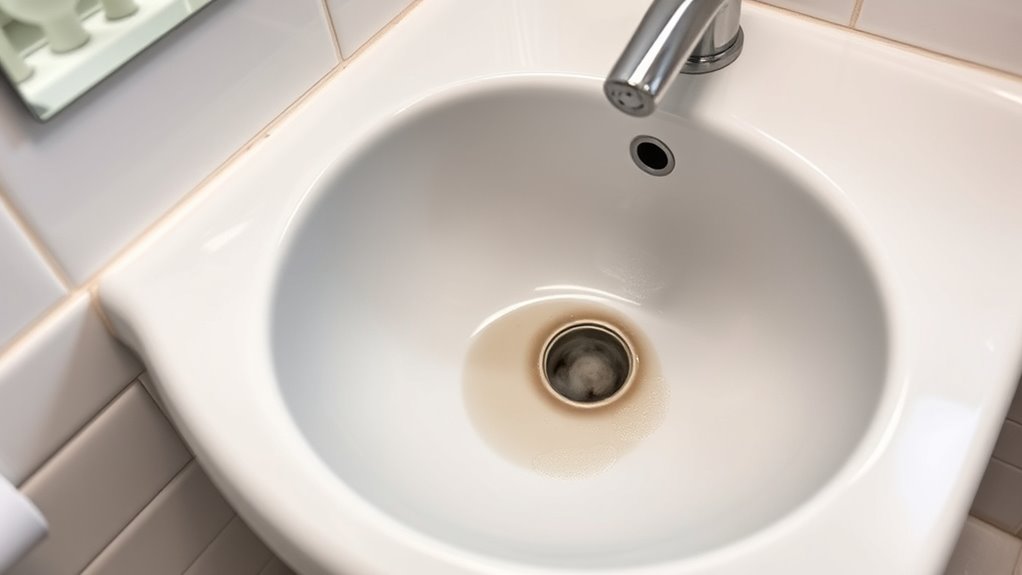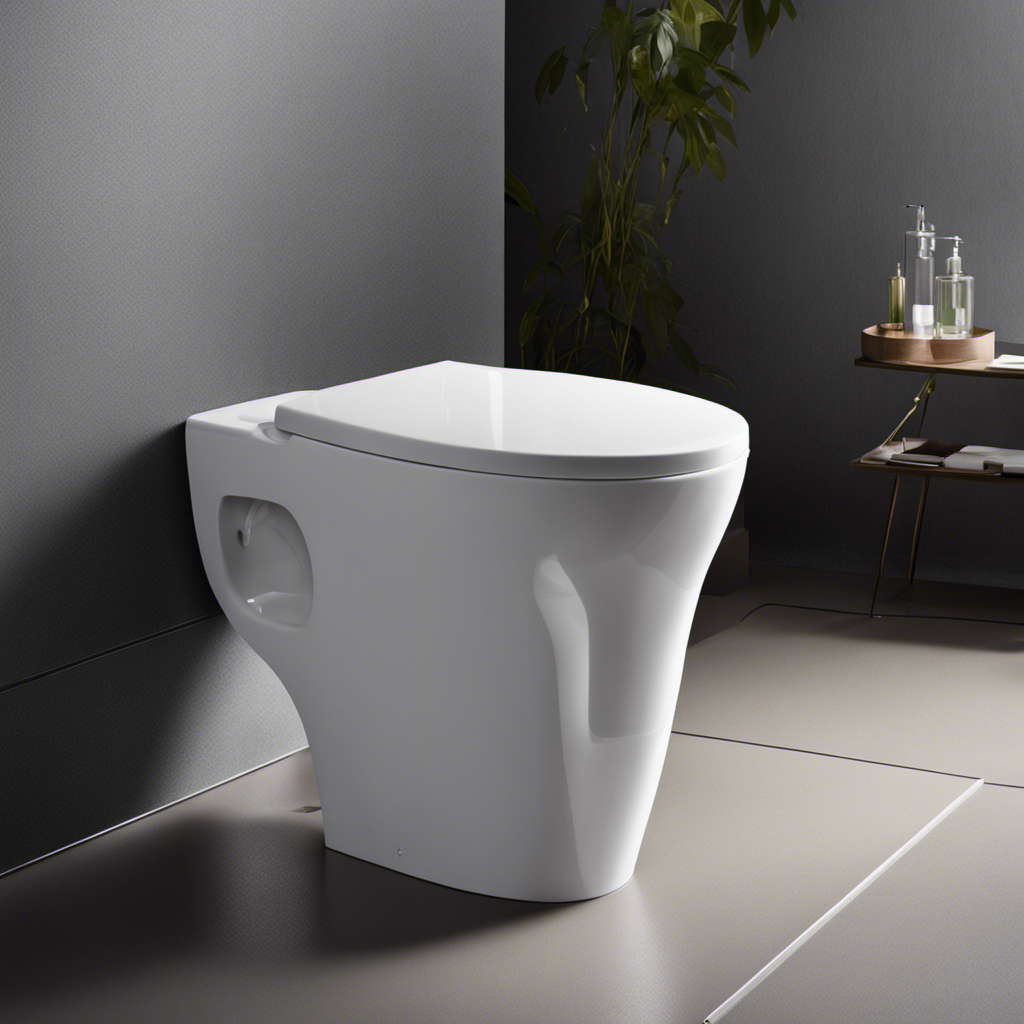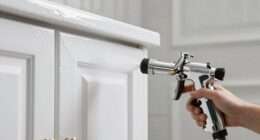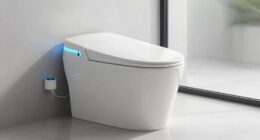If your bathroom smells like sewage, it’s likely caused by a dry or blocked P-trap, cracks in the toilet or sewer pipes, ventilation problems, or blockages in the sewer line. Leaks or damaged seals can also let odors escape. Sometimes, bacterial buildup or issues with floor drains and the septic system contribute. Proper inspection and repairs can resolve these issues. Keep going to uncover more common causes and simple solutions to eliminate those foul odors.
Key Takeaways
- Blocked or dry P-traps allow sewer gases to vent into the bathroom; regularly fill and clear traps to prevent odors.
- Cracks in the toilet bowl or seal leaks around the base can emit foul sewer smells; resealing or replacing may be necessary.
- Sewer line obstructions, such as clogs or tree root intrusion, cause backups and foul odors; professional inspection and cleaning help.
- Ventilation system issues, including blocked vent pipes or faulty exhaust fans, trap gases indoors, leading to sewage smells.
- Build-up of debris, grease, or bacteria in drains can produce foul odors; routine cleaning and drain maintenance mitigate this problem.

P Trap Cleaner Set,3 IN 1 P Trap Brush for Shower Kitchen Sink Bath Tub Bathroom,Including 20 Inch Drain Snake Remover,61 Inch Flexible Wire Brush,18 Inch All Bristle Brush
Ideal Set: Comes with 3 different p trap brushes including 20 Inch drain snake,61 Inch flexible wire brush,18…
As an affiliate, we earn on qualifying purchases.
As an affiliate, we earn on qualifying purchases.
Blocked or Dry P-Trap

A blocked or dry P-trap is a common cause of sewage smells in your bathroom. When the trap seal dries out or becomes obstructed, it allows unpleasant odors to escape into your space. Airflow restriction can also occur if debris or buildup blocks the trap, preventing proper water flow and seal formation. Without a full trap seal, gases from the sewer can vent into your bathroom, creating that telltale foul smell. To fix this, make certain the P-trap is filled with water regularly, especially if the fixture isn’t used often. Clear any blockages and check for leaks or cracks that might compromise the trap’s effectiveness. Restoring the trap’s seal and maintaining proper airflow stops the odors from seeping into your bathroom.

Fluidmaster 400AKR Universal All in One Toilet Repair Kit for 2-Inch Flush Valves, Easy Install
RESTORES OVERALL TOILET PERFORMANCE: All in one toilet repair kit replaces inefficient fill and flush valves, leaky flappers,…
As an affiliate, we earn on qualifying purchases.
As an affiliate, we earn on qualifying purchases.
Sewer Line Clogs
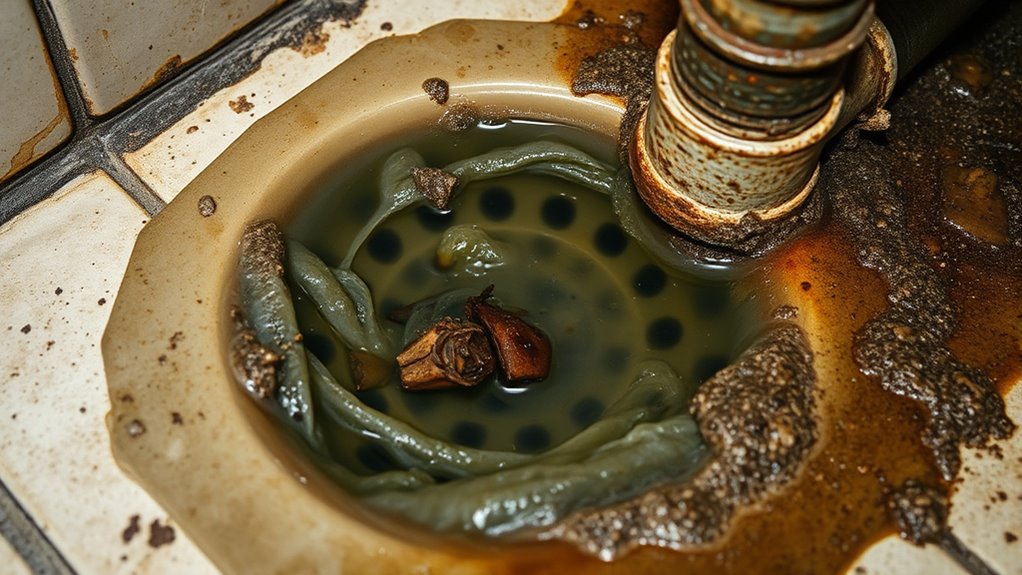
Sewer line clogs often happen when foreign objects, like wipes or toys, get stuck in the pipes. Tree roots can also invade and crack the line, causing blockages deep underground. Additionally, debris buildup over time can slow drainage and lead to foul odors. Regular inspections can help identify wear and tear early before major issues develop.
Blockages From Foreign Objects
Foreign objects often cause blockages in your sewer line, leading to unpleasant odors and slow drainage. These objects can be anything from hygiene products to small toys that accidentally go down the drain. When foreign objects get lodged, debris accumulation worsens, creating a stubborn clog. To prevent this, watch what you flush or dispose of in the bathroom. Here are common culprits:
- Feminine hygiene products
- Cotton swabs or wipes
- Small toys or objects
- Paper towels or wipes
These items don’t break down easily, causing blockages that trap debris and create odors. Regularly inspecting and avoiding flushing foreign objects helps keep your sewer line clear and prevents sewage smells from entering your bathroom. Additionally, understanding sewer line maintenance can help you take proactive steps to avoid costly repairs. Being aware of blockage causes can further assist in maintaining a healthy plumbing system. Proper disposal practices and timely professional inspections are essential for preventing sewer line clogs, and implementing preventative measures can significantly reduce the risk of future problems, ensuring your bathroom remains fresh and odor-free. Proper care of your plumbing system also involves understanding how foreign objects impact pipes, which can help you avoid unnecessary damage and expenses.
Tree Roots Penetration
Over time, tree roots can grow into your underground pipes, causing serious clogs and blockages. This happens because tree roots seek out water and nutrients, leading to underground intrusion into sewer lines. When roots penetrate your pipes, they create narrow pathways that can trap debris and slow water flow, resulting in frequent backups and unpleasant odors. As roots expand, they can crack or collapse sections of your sewer system, making repairs more complicated and costly. You might notice gurgling sounds in your drains or persistent sewage smells in your bathroom. To prevent this, regular inspections and root removal treatments are essential. Additionally, understanding sewer line maintenance can help you identify early signs of intrusion and avoid major repairs. Proper inspection techniques can help detect problems before they become severe. Regular maintenance, including root removal, can significantly extend the lifespan of your sewer system and prevent costly damage. Implementing advanced detection methods can further enhance early identification of root intrusions. In some cases, installing a root barrier can help prevent roots from reaching your pipes. If you suspect tree roots are causing your sewer issues, professional plumbing services can diagnose the problem and clear the intrusion effectively.
Build-up of Debris
Build-up of debris in your pipes is a common cause of sewage smells and frequent clogs. Over time, debris accumulation from hair, soap scum, grease, and foreign objects can clog your sewer lines. Regular drain cleaning helps prevent these blockages and odors. To keep your pipes clear, consider these steps:
- Use enzymatic drain cleaners monthly to break down organic debris.
- Avoid flushing non-degradable items like wipes or paper towels.
- Remove hair and soap scum from drain covers regularly.
- Schedule professional drain cleaning if you notice slow drainage or persistent odors.
- Maintaining proper ventilation systems can also help disperse odors and improve bathroom air quality. Proper ventilation is essential for air circulation, which can help prevent the buildup of foul smells in your bathroom. Additionally, ensuring your air purifiers are well-maintained can help minimize airborne pollutants that contribute to bad odors. Properly functioning exhaust fans can also significantly reduce moisture and odors, keeping your bathroom fresh.

DEPSTECH 50ft Sewer Camera, 1080P HD Triple Lens Borescope, 5" IPS Screen Endoscope with Light, IP67 Waterproof Plumbing Drain Pipe Snake Inspection Camera with 32G Card, Carry Case
Extended Reach with 50ft Sewer Camera Cable: The semi-rigid 50-foot plumbing camera snake cable allows you to insert…
As an affiliate, we earn on qualifying purchases.
As an affiliate, we earn on qualifying purchases.
Ventilation Issues in Plumbing System
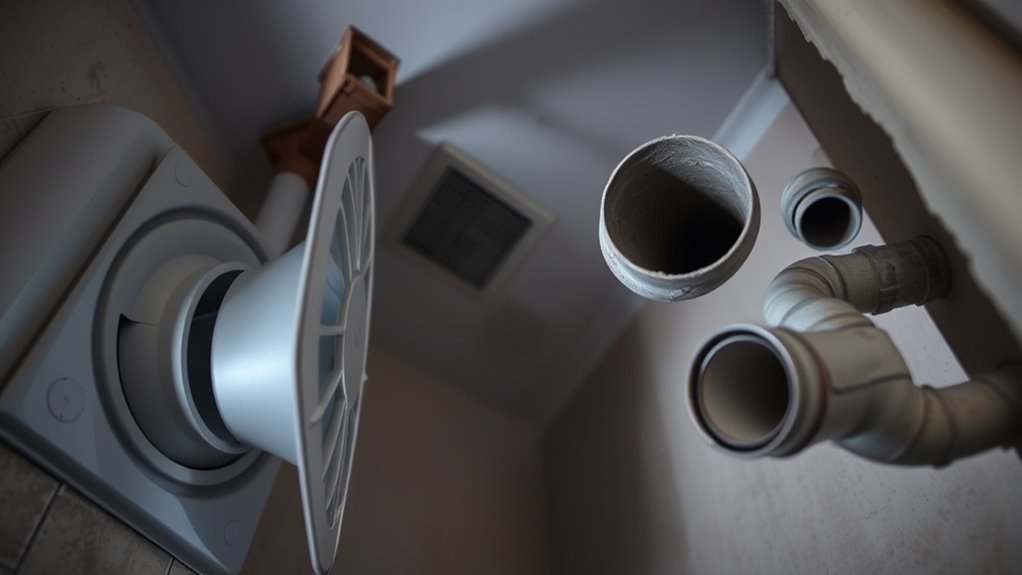
Have you ever noticed a foul smell lingering in your bathroom even after cleaning? This often points to ventilation issues in your plumbing system. Proper air exchange is essential to prevent odors from building up. If your vent pipe is blocked or clogged, it can trap sewer gases inside your bathroom instead of allowing them to escape outside. A vent blockage disrupts the airflow needed to equalize pressure, causing sewer smells to seep through drains and fixtures. Regularly inspect your vent pipes for obstructions like debris, leaves, or bird nests. Clearing these blockages restores proper ventilation, improving air exchange and eliminating the sewage smell. Proper ventilation is a crucial factor in maintaining a fresh-smelling bathroom and preventing ongoing odor problems. Addressing vent issues is a simple way to keep your bathroom smelling fresh and prevent ongoing odor problems. Additionally, using exhaust fans can help improve air circulation in your bathroom, especially if vent pipe issues are difficult to resolve immediately. Ensuring your home has adequate ventilation systems can greatly reduce the risk of persistent sewage odors. Incorporating effective airflow management techniques can further enhance odor control and maintain a healthier bathroom environment.

Broan-Nutone® Bathroom Exhaust Fan, 50 CFM Modern Grille, Energy Star Fan, 2.0 Sones
50 CFM BATHROOM EXHAUST FAN: 50 CFM is sufficient ventilation to remove, moisture, odor and pollutants from your…
As an affiliate, we earn on qualifying purchases.
As an affiliate, we earn on qualifying purchases.
Damaged or Leaking Sewer Pipes
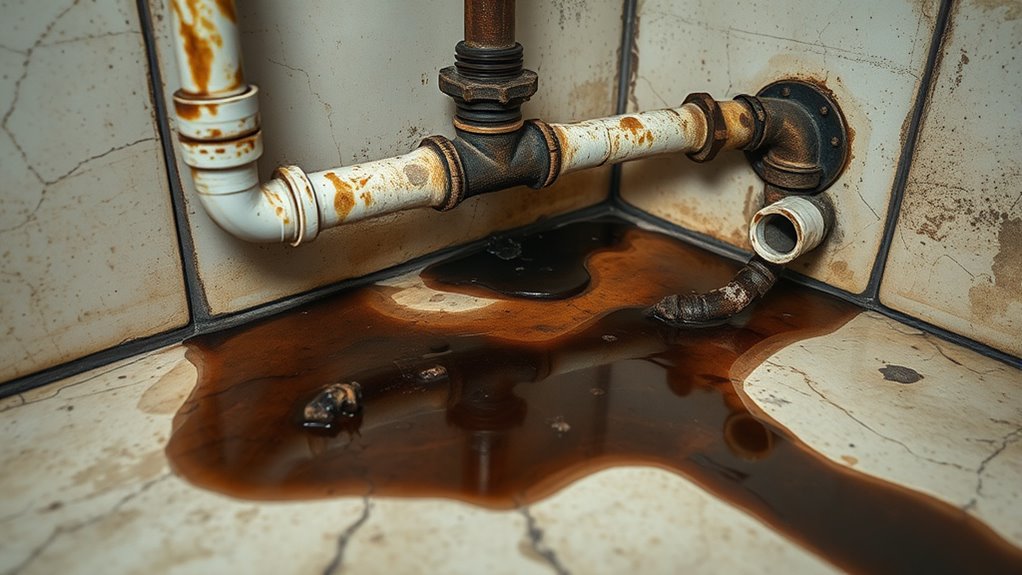
Damaged or leaking sewer pipes can cause foul odors to seep into your bathroom, often unnoticed until the smell becomes overwhelming. These issues typically stem from sewer pipe corrosion or pipe joint leaks, which weaken the pipe’s integrity. To identify problems, check for:
- Unexplained damp spots or wet patches near the floor or walls
- Visible corrosion or rust on exposed pipes
- Persistent sewage odors even when drains are clear
- Slow draining fixtures or gurgling sounds indicating blockages or leaks
Corrosion weakens pipes over time, increasing the risk of leaks, while pipe joint leaks allow sewer gases to escape. Addressing these issues promptly prevents further damage and keeps your bathroom smelling fresh. Additionally, proper pipe maintenance can help prevent future leaks and odors.
Cracked Toilet Bowl or Seal

A cracked toilet bowl or seal can allow sewer gases to escape, causing a persistent foul smell in your bathroom. Toilet bowl cracks, even small ones, can let unpleasant odors seep into the room. Similarly, seal leaks around the base or tank can create gaps for sewer gases to escape. Over time, these cracks and leaks worsen, increasing the smell. You might notice a faint sewage odor that doesn’t go away with regular cleaning. To fix this, inspect your toilet carefully for visible cracks or leaks. If you find cracks, replacing the toilet or repairing the bowl may be necessary. For seal leaks, resealing around the base with a proper wax ring or sealant can eliminate the odor. Addressing these issues promptly prevents further damage and keeps your bathroom smelling fresh.
Bacterial Buildup in Drains

Bacterial buildup in drains is a common cause of persistent sewage odors in bathrooms. Over time, organic debris and soap scum accumulate, creating a breeding ground for bacteria and leading to drain contamination. This buildup releases foul smells that seep into your bathroom air. To prevent this, consider these steps:
- Regularly flush your drains with hot water to wash away debris.
- Use a mixture of baking soda and vinegar monthly to break down buildup.
- Avoid pouring grease or oils down the drain.
- Clean your drain stoppers and screens frequently to reduce bacterial growth.
- Kia Tuning can help ensure your vehicle’s systems are functioning properly, preventing leakages that could contribute to unpleasant odors.
Maintaining clean drains reduces bacterial buildup, preventing drain contamination and keeping your bathroom smelling fresh. Addressing this issue promptly helps eliminate the sewage smell at its source.
Faulty or Blocked Floor Drains
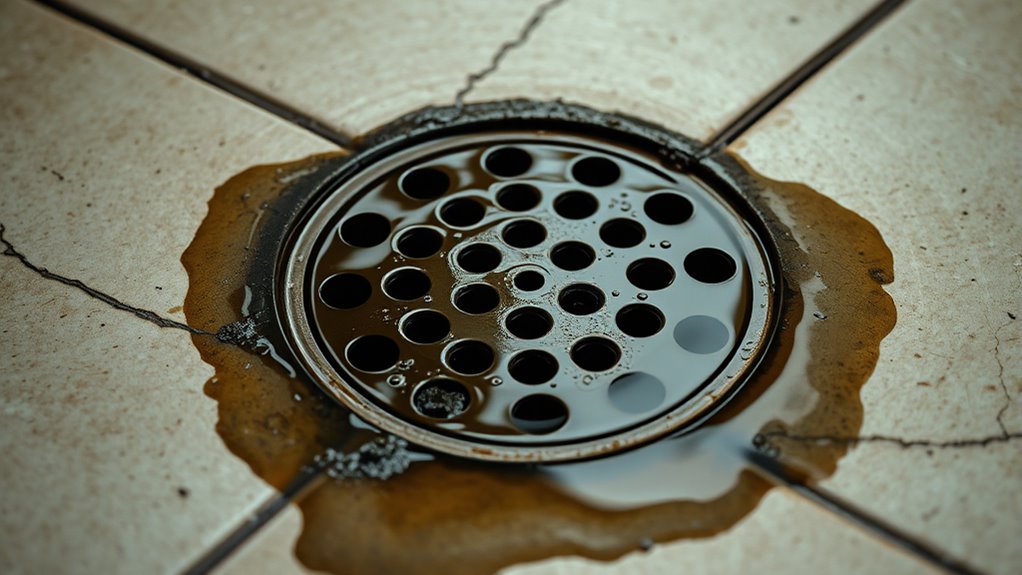
Faulty or blocked floor drains often cause unpleasant sewage smells in your bathroom. Blockages can result from debris buildup, improper installation, or poor ventilation that traps odors. Identifying these issues quickly helps you restore fresh air and prevent further problems.
Drain Blockages Causes
When floor drains become blocked or faulty, they can quickly cause unpleasant sewage odors to seep into your bathroom. These blockages often result from debris, grease, hair, or buildup that disrupts water flow. Over time, chemical reactions between trapped waste and water chemistry can produce foul smells. To address this, check for:
- Accumulated debris or hair clogging the drain
- Grease buildup creating a seal that traps odors
- Broken or damaged seals causing leaks and smells
- Poor water flow preventing proper drainage and odor dispersal
Blocked drains hinder water movement, allowing gases from sewage to escape into your bathroom. Regular maintenance and understanding water chemistry can prevent these issues and keep your bathroom smelling fresh.
Improper Drain Installation
Improper drain installation can lead to persistent sewage odors in your bathroom by causing floor drains to become blocked or dysfunctional. Installation errors, such as incorrect pipe alignment, can prevent proper drainage and create stagnant water that traps odors. When pipes aren’t aligned properly, water may not flow smoothly, leading to buildup and potential blockages. These issues can cause foul smells to linger around your bathroom floor. Additionally, poor sealing or incorrect slope during installation can allow sewage gases to escape through the drain. If you notice persistent odors despite clearing blockages, faulty installation might be the culprit. To fix this, you may need to have a professional recheck the installation, ensuring the pipes are properly aligned, sealed, and sloped for correct drainage.
Ventilation Issues
Blocked or malfunctioning floor drains can considerably contribute to sewage odors in your bathroom. Poor airflow caused by ventilation issues traps these smells, making your space unpleasant. Specifically, airflow problems and exhaust fan malfunctions worsen the situation. To address this:
- Check if your exhaust fan is working properly; replace or repair if needed.
- Clean the fan and vents to remove dust and debris blocking airflow.
- Ensure vents are unobstructed outside, allowing fresh air to circulate.
- Inspect floor drains for clogs or debris that hinder drainage and airflow.
Issues With Septic System
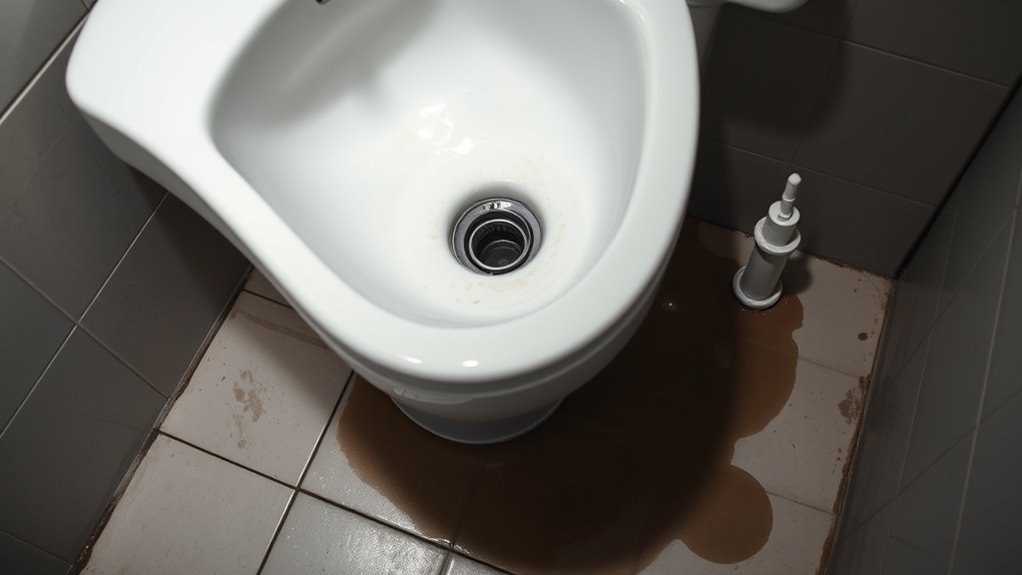
A malfunctioning septic system can cause foul odors to seep into your bathroom, making the space unpleasant and uncomfortable. When your septic system isn’t properly maintained, waste buildup or leaks can release unpleasant smells. Regular septic system maintenance, including septic tank inspection, is essential to catch issues early. Signs such as slow drains, gurgling sounds, or persistent odors suggest your system needs attention. If ignored, these problems can worsen and lead to costly repairs. To better understand, review this table:
| Issue | Cause | Solution |
|---|---|---|
| Foul odors | Bacterial imbalance in tank | Schedule septic tank inspection |
| Slow draining | Blockages or buildup | Regular septic system maintenance |
| Leaks or wet spots | Cracked or overflowing tank | Prompt repair and inspection |
Addressing these issues helps keep your bathroom odor-free.
Improper Bathroom Ventilation

When your bathroom lacks adequate ventilation, unpleasant odors from sewage or humidity can linger longer than they should. Improving airflow helps eliminate these smells quickly. Here’s what you can do:
Poor bathroom ventilation causes lingering odors; improving airflow quickly eliminates sewage and humidity smells.
- Install or upgrade exhaust fans to increase airflow enhancement and remove odors efficiently.
- Ensure exhaust fans are vented directly outside, not into attics or crawl spaces.
- Use timers or humidity sensors to automatically run exhaust fans when needed.
- Keep vents clean and unobstructed to maintain ideal airflow.
Proper ventilation reduces humidity buildup and prevents sewage smells from seeping into your bathroom. If your exhaust fan isn’t working effectively, replacing or repairing it can make a significant difference. Good airflow is key to controlling odors and keeping your bathroom fresh.
Frequently Asked Questions
Can Seasonal Changes Cause Sewage Odors in My Bathroom?
Seasonal fluctuations and weather impact can definitely cause sewage odors in your bathroom. During colder months, frozen or blocked vents may trap sewer gases, leading to smells. In warmer weather, increased humidity can intensify odors. You might notice these smells more during seasonal changes because of these environmental factors. To fix this, make sure vents are clear, and consider inspecting your plumbing for leaks or blockages that worsen with weather shifts.
How Long Does It Take to Fix a Sewage Smell Issue?
When it comes to fixing a sewage smell, patience is key. Usually, addressing the issue involves plumbing maintenance and inspecting your vent pipe, which can take a few hours to a day depending on the problem’s severity. You might need to clear clogs or seal leaks, and in some cases, hire a professional. Most fixes are quick, but complex issues could take longer, so don’t hold your breath.
Are There Safe DIY Methods to Eliminate Sewer Odors?
Yes, you can try safe DIY methods to eliminate sewer odors. Start by checking your vent pipe for blockages and clearing any debris, which helps ventilate your plumbing system. Also, perform drain trap maintenance by pouring water into drains to ensure traps hold enough water to block sewer gases. Regularly cleaning these areas can reduce odors, but if the smell persists, consider consulting a professional.
Can Using Chemical Drain Cleaners Worsen Sewage Smells?
Using chemical drain cleaners can worsen sewage smells because they often cause harmful chemical reactions that damage pipes and seals. This damage can lead to leaks or blockages, trapping odors inside your plumbing system. Instead, focus on regular drain maintenance like flushing with hot water or using natural solutions to keep your drains clear. Avoid harsh chemicals to prevent further issues and maintain a fresher bathroom environment.
When Should I Call a Professional Plumber for Odor Problems?
You notice a persistent, foul smell that just won’t go away. Don’t ignore it—this could be a sign you need a professional. Call a plumber when basic troubleshooting, like checking vents and traps, doesn’t eliminate the odor. They’ll perform a thorough plumbing inspection and odor diagnosis, pinpointing hidden issues. Acting promptly guarantees you avoid costly repairs and restore your bathroom’s fresh, clean environment.
Conclusion
Think of your bathroom as a tiny world, where each part plays a crucial role. When one element falters, like a blocked P-trap or a damaged pipe, it’s as if a small storm brews beneath the surface, releasing foul odors. By understanding these causes and fixing them, you’re like a skilled captain steering your plumbing ship safely through turbulent waters. Keep your bathroom’s ecosystem balanced, and fresh air will always prevail over sewage smells.
